#i have been positively reinforced for negative behaviors and will learn nothing from my terrible study habits 😭
Explore tagged Tumblr posts
Text
Hate the brain sometimes (every other day really 🙂👌) cause tell me why i was suffering thru studying this entire semester in agony over how i would rather be doodling and doing a million other things and now that break is here.......
nothing, no motivation, no ideas, just meh and blehhhh and timeeeee
#think the answer here is to doodle things and hate it but at least do SOMETHING 😭#if there's any other answer let a bitch knowwww?!?!?!#also omg thought i was gonna fail everything and now find out i did actually okay and so again#i have been positively reinforced for negative behaviors and will learn nothing from my terrible study habits 😭#(but like im totally not complaining universe thanks for the passing grades universe 😁)#but i digress
2 notes
·
View notes
Text
Psychology in Whump: Conditioning
OKAY, some of y’all know nothing about conditioning, so I’m gonna clear some things up. Don’t feel bad, these are common mistakes. I’m basing this off of everything I learned in AP Psychology, so I know what I’m talking about more than the average person. If you ever have a psychology question, you can always send an ask and I’ll be more than glad to answer.
Classical Conditioning
Ever heard of Pavlov? This is what he did. Essentially, this is call and response.
There are four things: Unconditioned Response, Conditioned Response, Unconditioned Stimuli, and Conditioned Stimuli.
Let’s use Pavlov to explain this. Pavlov was a doctor doing experiments on dog salivation and accidentally made a huge psychological discovery. Essentially, he would ring a bell every time he was bringing food to the dogs. Over time, the dogs would salivate when the bell rang, even if there was no food.
The Unconditioned Stimuli was the food, and the Unconditioned Response was salivation in the presence of food. Dogs do not have to be trained to salivate when there’s food. That is an innate biological response.
The Conditioned Stimuli was the bell, and the Conditioned Response was salivation upon hearing the bell. Dogs don’t normally salivate when they hear bells; Pavlov’s dogs were conditioned to.
Classical conditioning works when Unconditioned are combined with the Conditioned. Over time, Pavlov’s dogs connected bells with food. They knew a bell ringing would mean food. So their salivary glands would jump the gun on salivation, and they’d salivate no matter what.
Classical conditioning can easily happen by accident, as was the case with Pavlov. It can also be done on purpose. To give a whumpy example, perhaps a whumper classically conditions the whumpee. The Unconditioned Stimuli could be whipping. The Unconditioned Response could be fear, panic, crying, begging, something along those lines. The Conditioned Stimuli could be AC/DC music that the whumper had on speakers while whipping the whumpee. The Conditioned Response could be being scared/panicking/crying/begging/etc when the whumpee hears AC/DC. Perhaps it was accidental on the whumper’s part, or perhaps it was intentional. Either way, upon learning this, I’m sure the whumper would enjoy turning on “Thunderstruck” and listen to the whumpee beg even though the whip is nowhere in sight.
Classical conditioning can be broken, as can any form of conditioning. That means a whumper has to alternate between whipping and not whipping when AC/DC is on. If they go to long without the whip, it can dampen the conditioning. With some exposure therapy, a caretaker can also help the whumpee listen to AC/DC again. If a caretaker exposes the whumpee to AC/DC multiple times and no pain is involved, then eventually the conditioning will dampen or be gone entirely.
Depending on multiple factors, some things can be deconditioned faster than others. Pain is a big factor. I’ve classically conditioned myself to dilate my eyes when I hear my ringtone once for my psych class, but it lasted fifteen minutes. Because it wasn’t life threatening and no pain was involved. Your brain will latch onto things related to pain. So anything the whumper does will have a long lasting effect on the whumpee. Time is also huge. If the whumper has only whipped with AC/DC a couple of times before, the whumpee will be conditioned, but it will break fast. So a caretaker wants to rescue the whumpee fast to make deconditioning as fast as possible.
Actually, for another prompt, Pavlov’s experiment could work for a pet whumpee. Then there’s even more comparisons between them and a dog.
Classical conditioning, generally, is harmless, or even helpful. At most, generally, irrational (for example, dog bites you for once and now you’re scared of dogs). But usually it’s little things that don’t matter all that much (flinching when someone pretends to throw something at you) or helpful (fear of strangers). But give a whumper classical conditioning, and your whumpee is in for a bad time.
Operant Conditioning
“Michelle, I already know about positive and negative reinforcement!”
“Great, can you tell me about it?”
“Positive reinforcement is giving a reward for a behavior, and negative reinforcement is a punishment.”
NOOOOOOOOOOOOOOOOOOOOOOOO
THAT IS NOT WHAT NEGATIVE REINFORCEMENT IS.
Repeat it after me.
Negative reinforcement is not punishment!
There are in fact four things involved in operant conditioning: positive reinforcement, negative reinforcement, positive punishment, and negative punishment.
Reinforcement is meant to increase a behavior.
Punishment is meant to decrease a behavior.
Positive means it is adding something.
Negative means it is taking away something.
Positive Reinforcement is when you give something to increase behavior. This is often called the “carrot.” Letting a whumpee sleep with a blanket when they are good is positive reinforcement. The whumpee is more likely to be good for the whumper and not defiant because they were rewarded for their compliance. Or it could be caretaker giving praise to the whumpee when they are recovering and don’t call caretaker “Master.” The whumpee is more likely to call the caretaker by their name than “Master” now that they’ve been praised for it.
Negative Reinforcement is when you take something away to increase a behavior. This could be a caretaker giving whumpee ibuprofen for a headache. Taking ibuprofen takes away the pain, which makes the whumpee more likely to take ibuprofen for headaches in the future. A whumper taking away the whumpee’s mobility via restraints will make the whumpee stay where they need to be. In the future the whumpee will stay even when not restrained.
Positive Punishment is giving something to decrease behavior. This is the “stick.” Your average whump is positive punishment. Whumper beats whumpee for not being good? Positive punishment. A caretaker can also practice this theoretically (I’ll talk about healthy conditioning later). Caretaker could give whumpee a stern talking to for acting out. They’d have to be extremely careful though, and I’ll talk about that in a moment.
Negative Punishment is taking away something to decrease behavior. The whumper can take away the whumpee’s shoes to decrease their behavior of trying to go outside. The caretaker can take away the whumpee’s collar to decrease any behaviors associated with being a pet.
Some of these can be kind of two at once. For example, the caretaker taking away the whumpee’s collar so they don’t act like a pet is negative punishment. If you rephrase it to say the collar is taken so the whumpee acts more like a person, that is now negative reinforcement. The action of removing the whumpee’s collar is both negative punishment and negative reinforcement, it just depends on how you look at it.
Conditioning isn’t inherently bad. Everything in existence has the potential to be good and the potential to be evil, it just depends on how we use it. Conditioning can be very good, very bad, or not affect anything. It all depends on how it is being used. There is healthy conditioning that is very good. Through too much or too little operant conditioning, you can have serious psychological problems. For any of you guys that have kids you take care of in your life, a good mix of these four is healthy when done right! Generally you should do more reinforcement than punishment when possible because it helps with motivation (which is a long rabbit hole we won’t go down today), but punishment isn’t necessarily bad. I’ve given both good and bad examples of all four types of operant conditioning. Whether it’s good or bad depends on the person.
I can go into greater detail on all four for both the whumper and the caretaker, but I think most of it you’ll have down now. I’ll delve into positive punishment by the caretaker to demonstrate this specific problem the caretaker might run into. While this does include the whumper’s beatings and torture, positive punishment isn’t necessarily physical. With children, typically adding chores or lecturing is good. Not necessarily with a whumpee if you want the whumpee to recover (though, I suppose you could make the caretaker terrible at their job and accidently punish the whumpee in unhealthy ways for more whump). If a whumpee was a slave and forced to clean, the caretaker shouldn’t make cleaning a punishment. It will positively reinforce the behaviors the whumper wanted, which is not good. If the whumpee was “lectured” to (way more maliciously than a typical parent would), lecturing would be a terrible idea because it also would reinforce the whumper’s desired behaviors from the whumpee. The caretaker has to be extremely careful with all four methods. They have to be careful to not reinforce the whumper’s desired behaviors and punish the undesired ones. Which can be really hard if the whumpee hasn’t told the caretaker what happened (HINT HINT this could be some good whump HINT HINT). The caretaker can also do mini physical positive punishments, like in @deluxewhump ‘s Max and Pet series when Max hits Carlo with a rubber band. ONLY IF THE WHUMPEE FEELS THEY NEED SOME SORT OF PHYSICAL POSITIVE PUNISHMENT. If the whumpee doesn’t want anything to do with being hurt, do not do this, this is what the whumper would do. This only really works with small things like rubber bands or else it is too painful and that is especially problematic for all involved. Physical positive punishment done by the caretaker is not ideal, but can be helpful in the early stages of recovery with some whumpees.
As for deconditioning, studies have shown that if after every time a person does the behavior, they get the consequence, they decondition faster than if it’s every few times. Which might be good for the whumpee! Most whumpers I’ve seen are pretty consistent about always punishing or reinforcing the whumpee! Though, if you get a psychologist whumper...that can suck for the whumpee. I can go into more detail later on this since this kind of gets tricky. Look up operant conditioning schedules if you don’t want to ask.
Social Conditioning
I’m not going into a lot of detail because if I do I’m going to go into social psychology and that’s its own field and we don’t have time for that.
Basically, we act like people around us. This dives into conformity and roles and whatnot. We’re all socially conditioned. This especially effects kids. They watch adults do things and imitate the adults. That’s why kids know you are supposed to hold your phone up to your ears and talk. This is why people don’t want kids watching rated R movies because studies have shown that when kids watch violence they are more likely to be violent, especially the younger they are, and no one wants a ridiculously violent five year old. I can name a famous experiment for this, Bandura’s bobo doll experiment, where kids watched adults beat up a bobo doll and then proceeded to do the same.
This can be used in whump for whumpees raised in slavery because they’re socially conditioned to act like a slave. And it would be so hard to break that conditioning. If you have ever moved to a country with a vastly different culture you’d know how hard it is to break social conditioning.
Now That You Have That…
Go and write conditioning correctly. Seriously. Psych nerds hate hearing the “negative reinforcement is punishment” thing. Seriously, please don’t. And please reblog so people will see this so that more people in the whump community will learn this.
If you ever have questions concerning psychology, send me an ask, I’ll be more than glad to help! I love psychology! This can go for disorders, therapy, social psych, learning/conditioning, memory, motivation, health, development, etc. If I don’t know the answer, I can look it up, or give you good sources to look into.
For anyone interested, I recommend taking psychology classes. If you’re in high school I recommend AP Psychology, and I don’t know anything about college psych classes, but I’m sure there are good ones. It will help you in your day to day life and help you write whump. Plus it’s fascinating.
#whump#whump help#psychology#conditioning#writing tips#operant conditioning#classical conditioning#social conditioning#seriously send me an ask if you have psych questions#i'd be more than happy to help#but y'all better do conditioning right now#didnt type all of this for nothing#seriously i will write more on psych#send me asks#i'll even tag you if you want to see these#just...please#and check out my whump stories if you want
61 notes
·
View notes
Text
i look back on horror at who i was as a child a lot bc it was bad and i did bad things. but just now i felt kind of fond of little me and proud. bc i did survive and i was smart.
i got sparked thinking about this bc i was thinking back to being really little. really little, potty training and earliest memories. i was so motivated to be perfect and actually i was good at getting approval. it’s sad bc thats what shaped the bad part of me. at this deep level i learned i did not want to be punished or disapproved of and so i tried to distance myself from my brothers who were punished and compared negatively to me.
it’s weird bc for so long i felt shame about this. when i was in high school i apologized to my brothers in tears bc theyd often been resentful of me when we were young and i felt guilty for being the baby who got away with things while they were punished. from like age 2 to age maybe 10 i had a p bad superiority complex borne out of this and i just felt like a bad person for it for a long time. plus i didnt fully break out of the mindset til i let go of inferiority/superiority.
i do see that i was just a child but thats kinda the part that feels like a horror movie. if i think of it being a child who was in situations i was and doing things i did, it feels horrifying. so most of my thinking back on being a kid are kinda disturbing.
but im kinda getting back in touch w the part of myself i love for the past few years. and you know i survived for a reason. bc i love life and there are parts of me that are strong. what i was thinking about that started all of this was the kind of two-sided split nature of my childhood. what actual form did it take.
i was absolutely obsessive about adult approval. to a degree that was v annoying to other kids but worked. i didnt necessarily SHOW that i was obsessed w it and i dont think i was even thinking consciously about it. a lot of my memories go in this vein. like i was good at memorizing bc that was asked of me. i could intense laser focus on things and memorize them. i remember frantically memorizing Bible verses at age 5 to win the Bible verse memorizing competition which the adults put on.
all of my strengths i had to be best in and all of my weaknesses were sources of shame i tried to improve on. i took very seriously morality as it was taught to me and made a great show of following it. i was often what you could consider teachers pet and basked in any positive reinforcement thrown my way.
i was addicted to avoiding punishment and seeking reward. it was a response to my highly behaviorist, authoritarian upbringing. my emotional state in relationship with adults could vary wildly depending on how they treated me. i had a teacher in fourth grade who seemed to dislike and undermine me, like she wanted to break me, and i internalized my idea of her to help shape myself into someone who she would like. and it mostly worked.
the intensity of my ability to do stuff like this cannot be understated. i learned to totally supress my sensory problems because they made adults annoyed with me and might lead to punishment (also i had to learn to deal with them alone because i had no help). i learned how to present a certain type of acceptable personality.
i should note that i learned to do this first because of my parents. i learned later, but very young, that i had been easy to potty train. i was often praised both for being intelligent but especially for being “easy” and obidient. the perfect child. as compared to my brothers who wet the bed and had to be punished for it. ive thought for a while that the reason i was so obsessed with being perfect in school is that my mother homeschooled me and my brother for kintergarden. she screamed at him for being stupid. never me.
being better was being safe. so i became this person who had to follow all the rules and be best at everything and i always wanted to be assured that i had earned love by my behavior.
but the oddest thing about this is that i was a totally anti-authority, rebellious, and single-minded child. this is how the split in my personality manifested when i was little. any time i sensed any kind of unfairness i was livid. i undermined authority figures behind their backs with other kids. i got around rules however i could.
the thing was, i think, even when i was very little, was that i knew it was arbitrary. the authority my parents wielded over me and my siblings was incomprehensible. i couldnt follow it. i just knew that they were in charge so they could do what they wanted. they were inconsistent in their punishments and rewards. sometimes they punished you for nothing and sometimes you got away with doing something actually bad. they weren’t fair. they just made it up as they went along.
i wanted to do what i wanted to do and really i felt no attachment to their judgment on it--at least this side of me didnt. and it goes back just as far, maybe farther, than the feeling of superiority or desire for approval. i think that came more as i became afraid of punishment.
i have very young memories of defying my parents authority. i just wanted to get away with it. and i almost always did.
it’s funny because my entire family has always judged me for that but now i look back with some admiration. i mean i was obsessing with how to get away with things in my youngest memories, like age 3. all throughout my childhood i broke the rules to do what i wanted.
when i was thinking earlier, what came to me was that i always acted to get approval so that i could get away with things and do what i really wanted to do. my main occupation as a child was reading. i was approved of for it. i read so much! i was such a smart little girl! and i could get away with spending all my time away from people in another world, the world of my books. i was quiet and out of the way so i was a good child. and that was one of the main sources of happiness in my childhood, reading, escaping, learning, being somewhere else.
i waged a warfare against authority quietly. i learned to give them what they want and then do whatever i wanted when they looked away. i did it all the time. the side of me that wanted approval and the one that wanted freedom were somewhat dissociated so i didnt even fully realize i was doing it.
i think what caused a lot of the change was falling from grace. in my own eyes, in my projected, perceived vision of God, and in the eyes of adults. it happened around age 10 and 11. i went from a very high to very low opinion of myself quickly. i think some of it was having a teacher who simply did not and would not like me, who wanted me to be smaller. she didnt like that i was disorganized and said i had terrible handwriting. she wasnt cruel but she wanted to destroy me for my own good. she constantly put me down and made me a subject of ridicule in class.
i was also thinking more about Christian morality. the more i learned about God and heard about sin the more i felt i was a sinner. i felt bare and stripped naked, disgusting before God.
i had humbling experience after humbling experience--internally as i reflected on my behavior and externally though rejection by peers, failure in school, and adult disapproval. it wasnt possible for me to feel approved of, perfect anymore. i could only be bad.
i kept going further and further with this until i was reborn and rejected all of it. i stopped being Christian and rejected God’s authority. Christianity was the only worldview i had ever been allowed to imagine. once i stopped believing in it i was separate from every person around me. i could not, as a human being, have anyone’s approval.
i wasnt the golden child at school or at home any more. i started getting in trouble in ways i never would have before because i was more defiant openly. a teacher took my kindle from me in 8th grade and i was punished for stealing it back. i had used to never talk back to my parents but i started to. i was angry. the dynamics in my family shifted and sometimes i was the scapegoat, sometimes i was the one being screamed at, punished, hit the most. me and my siblings played hot potato for it. golden child shifted around too. but i would never be the favorite again. by the time my parents went back to fawning on me, when i was a successful college student, i had no taste for it.
starting around age 13. i had to become my own internal source of approval, authority, and being. i started to parent myself. i developed an internal parent who nurtured me and i sought out a lot of media about good and loving parents. i cried alone all the time but when i was calming down, i would stroke my own hair and talk to myself. i thought for myself and made up my mind about things. i had my own internal sense of morality that wasnt based on punishment and rewards. that made me a better person. before i had broken any rule with no guilt. i did not consider right and wrong of the action, only likelihood of punishment or reward. when i was giving myself approval, /i/ had to approve of my actions.
idk ive just rambled a lot but i guess ive been thinking tonight about how ive reacted to environments and how ive changed myself as a person. i have these moments, shorter periods in my life, where something totally shifts in me. but that doesnt make long term effects just go away. i still worry about approval and punishment. i still punish and reward myself. these things are ground into me. inferiority/superiority too. but i saw through them and i have changed.
1 note
·
View note
Text
Mutsuki, Gratuity, and Violence
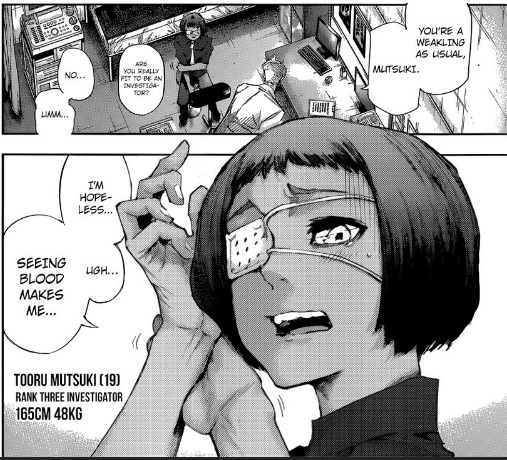
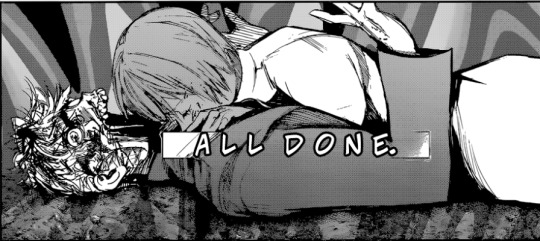
Mutsuki’s behavior is shocking to say the least. There’s been a lot of speculation made of exactly why his character made the turn it did from introduction to this point. I’m going to attempt to give my own personal interpretation, on putting together an arc for Mutsuki, and what point Ishida intends thematically by bringing out Mutsuki’s violent side the way he did. Note, this meta is almost entirely about violence, so besides spare mentions of torso the sexual aspect of Mutsuki’s character are not going to be explored. I’ll do that in a later post.
Read more under the cut:
There are several problems with Mutsuki’s portrayal as of now, especially the oversexualization of the only trans character in the cast (In comparison Urie also had a fugue state lashing out of violence this arc but he didn’t like, rip his shirt off or anything), and also what Mutsuki’s thoughts on his gender are being sloppily and confusingly conveyed to the audience. I acknowledge that these problems exist, but this meta is not about that because I want to focus on story and character for now.
In the words of @hysyartmaskstudio Mutsuki’s thread right now is a B-Plot or Sidestory.
And it is ultimately a side story. Side stories ideally are meant to bolster the main narrative, either further reenforcing themes in a way the main narrative could not, or providing backstory to characters necessary to the main narrative in order to make them more effective in that main thread.
A much clearer sidestory example would lie again in Urie. Here in chapter Set P, Urie framing out (The B scenario) shares the same chapter with Amon stepping out from the pod and activating his Kagune (the A scenario because the main character Kaneki is experiencing it). This is because not only are their situations similiar, both are former investigators turned ghoul losing control of their power.

There’s more to it than that though, as the characters are foils things said directly about Urie can be applied also to Amon. It gives us a reason for why Amon despite being conscious enough to remember how he became a ghoul would immediately jump out of the pod and start attacking.

Both of them are lashing out against the environment around them, because of a very basic and deep wound inflicted upon them by their fathers which they cannot possibly cope with on their own. Not only does this writing tidbit inform something not necessarily explained in the text, but it also gives a new perspective on Amon. His long thought selfless and noble quest for justice, can be compared to the selfish glory hogging actions of Urie Kuki much more closely than one would have thought. This hunch about the relationship between their fathers, and also both using their extermination of ghouls as a substitute for their issues is then confirmed a few chapters later by text, more or less.
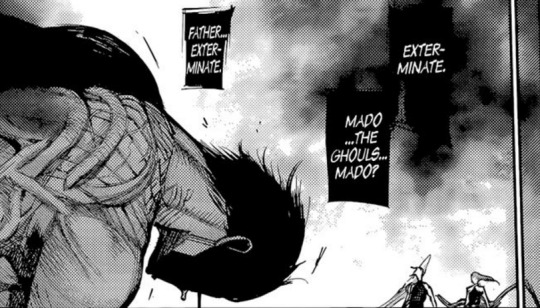
This is a really clear and efficient use of a sideplot to go back and inform the main plot. However, Mutsuki’s is much more muddled, and a lot of readers unable to understand the point behind showing Mutsuki in this light have dismissed it as cheap gratuity for shock value.
While there’s an element of truth to that interpretation, I would say Tokyo Ghoul is using its genre as a way of expressing an idea. I’ve discussed this before in previous meta, but I consider Tokyo Ghoul to be Pulp, rather than straight horror.

Pulp itself has a long history of representation of otherwise non-mainstream topics of discussion (apparent taboos such as homosexuality and transgender characters), because of their cheap and not as regulated method of publishing. The name pulp coming from the cheaper way of printing the paperback book covers that essentially made them a dime a dozen. However, because they were so cheap these topics were often presented in exploitation fashion in order to draw more readers who would only get one glance at the cover. This is how the genre of ‘Pulp Exploitation’ arose, this is the film genre that Quentin Tarantino pays tribute to (the most obvious example being Pulp Fiction). There also exists exploitation of minority B movies, Black Dynamite is a parody of blaxploitation films.
The point of that brief introduction to pulp being there is a long history of showing representation through exploitation, in the genre of pulp itself. It’s not a good thing of course, but it’s not pointless either it does say something. At the bare minimum besides being an expression of genre, it’s very eye catching. So, starting with a baseline interpretation, Ishida drew Mutsuki like this:
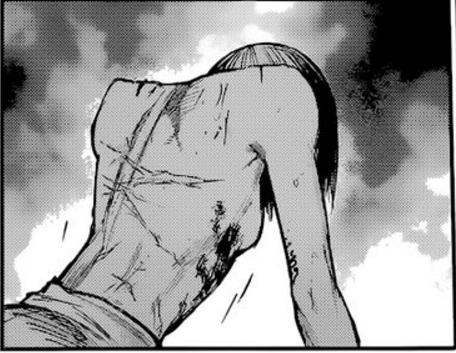
Because he wanted the audience to notice something that they hadn’t before. With the discussion above, about the relation of B to A plots, and also the inclusion of Haise Sasaki within this scene as a direct line back to Kaneki, this scene must be to inform us of something we are missing in the A plot.
So, to continue this analysis let’s talk about the two characters that foil Mutsuki the most right now.
Suzuya Juuzou, or How I learned that becoming a CCG agent does not solve all your problems.
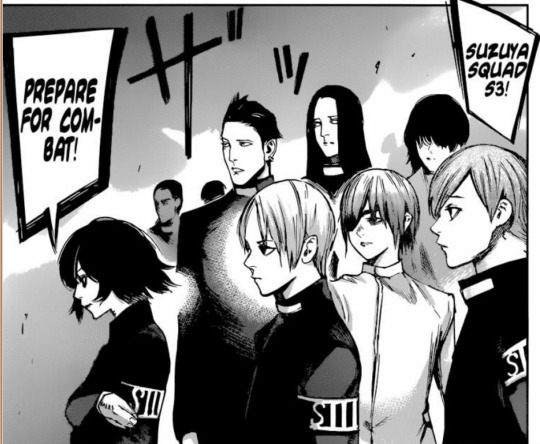
Mutsuki’s reassignment to S3 rather than the main Quinx squad under Urie is purposeful for this arc, as Mutsuki has been serving as a narrative foil for Suzuya for a long time. Suzuya being one of the first characters to mentor Mutsuki and having a profound effect on him, causing his first leap in ability and rank after the auction.
Just as Suzuya, Mutsuki managed to be promoted two ranks at once a feat only ever acquired by Arima before that. The two of them also share similiar backstories of abuse by parental figures. If you want more elaboration I covered the ways in which they are similar and different in this post here (x), for now though I am going to attempt to postulate on what lining their character arcs together means for the story.
To be more precise, I want to talk about why Suzuya’s arc is a progression that is positive character development, while Mutsuki’s is regression, negative character development. Even though the two of them went through the same basic arc (unable to fit in within the ccg -> gained power and confidence from a specific mentor -> found their place within their own squad and became a person willing to protect their friends).
Why did this pathway work perfectly for Suzuya, but fail for Mutsuki?
Let’s start in a very basic difference between their two characters, which is demonstrated to us by a parallel. Back in the academy, both Suzuya and Mutsuki were accused of killing cats, and interacted with Tokage. However, Mutsuki was actually murdering those cats, while Juuzou did not.
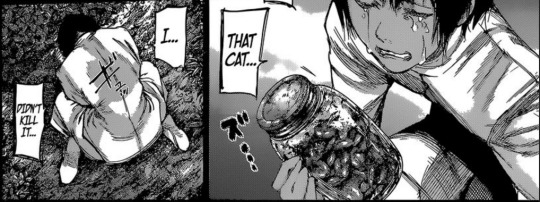
Why go so far as to establish this difference, when Mutsuki’s behavior towards his family already showed that he had murderous tendencies? Is it to show that Suzuya is a better person than Mutsuki? Doubtful.

Juuzou did not kill the cats, but also he did not see the problem in them dying. At the time he had no value for life. The only reason he was not killing the cats is because he had no motivation to kill them. While, Mutsuki killed the cats because he found internal motivation to do. It’s a question of motivators, Juuzou’s are all external, while Mutsuki’s are internal. it goes back to their starting incidences of trauma.

Juuzou’s abuse revolved entirely around positive and negative reinforcement. He would fight to earn good boy points, and then have pain inflicted upon him. We also know though his mother intentionally would treat him kindly at times, just so Juuzou would be easier to manipulate and would not turn against her. His sense of self eroded and he lost all meaning to life.

When we see Juuzou recklessly attacking ghoul life later on, it is because of this conditioning inflicted upon him. He has been taught that he has to be violent in order to gain a reward, and after leaving that environment he was put into the CCG where violence against ghouls is rewarded. He specifically cites their roles as ghoul investigator and ghoul as an excuse for his own violence against them. “There shouldn’t be a problem if I were to kill you, right?” (A line later referenced by Centipede Kaneki, if you need a reference as for how unstable Juuzou is being here).
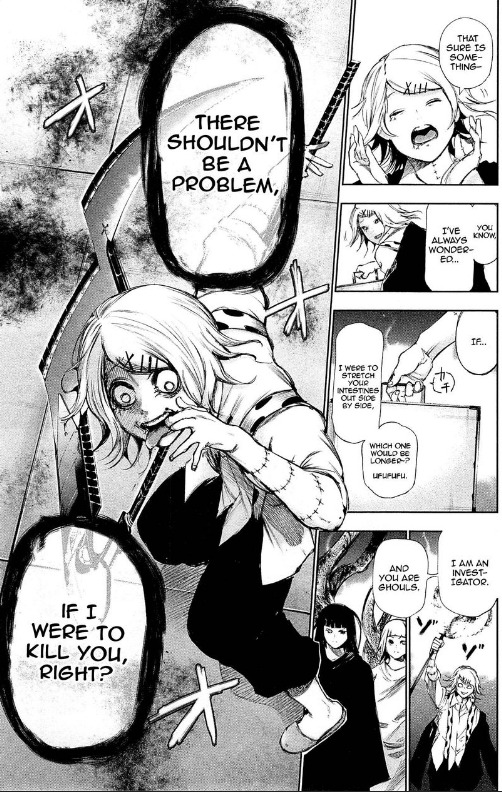
As a side note though before I finish ths point, Juuzou is engaging in hyper violence in this scene. The same kind of hyper violence (mixed in with hypersexuality in Mutsuki’s case) that Mutsuki engages in, in these last few chapters. What does it show here though. In this case, is Juuzou not performing the exact same task he did s a scrapper, but only with a different master. Using hyper violence draws attention to just how cruel Juuzou is being here, is it really okay for him to act this excessively just because Kurona and Nashiro are ghouls? Is that violence somehow only bad when it’s conducted against humans?
If Juuzou is just being violent again in the hopes of achieving external reward though, the CCG has done little to nothing in terms of breaking him from his bad coping mechanism. (This is what we are discussing here, both Mutsuki and Juuzou suffer from terribly violent coping mechanisms in dealing with their trauma, I can argue the narrative has gone through great lengths to show that rather than just dismissing them as bad violent people). Then, what is it that helped Juuzou break free from this chain and allowed him to grow.

It’s easy to give a shallow reading of events and say it was because the CCG rescued him that Juuzou eventually found stability. However, as I’ve hopefully proven above the CCG did little to help him, and were more than likely taking advantage of his violent tendencies as long as they were pointed at ghouls. It was rather the efforts of an individual who reached out past the system in order to help Juuzou, and try to give him positive reinforcement simply for existing and being a person, rather than having to kill to earn it first.

Juuzou’s arc is therefore misleading. He is integrated into the system of the CCG and improves, but it is not the system itself which leads to him improving, but rather the actions of individuals outside of the system.
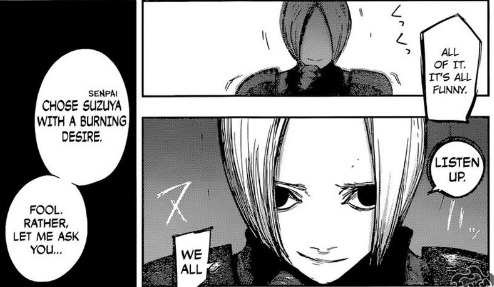
At this point, Juuzou’s need for positive reinfrocement is basically resolved. While he is still stigmatized by a portion of the CCG, he is surrounded by his own squad who look up to him, praise him, and try to take care of his individual needs. Juuzou in return genuinely values their lives and wants to protect them. He’s crossed the barrier of learning to understand human relationships and have functioning relationships with others, and considering the massive amount of time the Suzuya Squad hang out, their relationship even bypasses the problem of the CCG hierarchy of not allowing themselves to have anything more intimate than work based relationships.
Suzuya has found what he was looking for in trying to placate Big Mama, a genuine family.

However, it would be a mistake to assume Juuzou’s development stops entirely here. Even after being given a supportive surrogate family, and a secure place within the CCG Juuzou’s empathy problems still exist arguably. One, because if Juuzou did not grow anymore as a character in RE: he would not be featured so heavily in the narrative, and two becase there are plenty of hints of it still in the narrative.
Juuzou’s current choice to move from enjoying the killing of ghouls, to regard it as just a job is still a wrong one. Especially if the manga is making the argument that ghoul life is just as worthwhile as human life, a point coming to a head in this arc. While Juuzou is much less sadistic an individual, he’s still doing things like this to Kurona, showing her no sympathy to the point of his entire squad laughing cruelly at her.
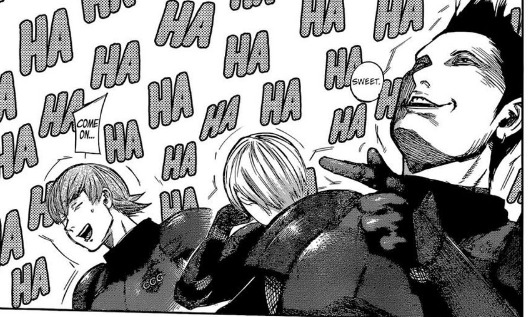
And then walking around wearing everybody’s favorite peace loving dad for armor.

Why should Juuzou even be asked to show sympathy for Kurona? Look at the chapter both of these screencaps are taken from Ch: 87, A Hated Child. That was what Juuzou was in the past, and Kurona is now. The reason Juuzou should be asked to have sympathy is because the reason Juuzou is standing where he is has nothing to do with his personal strength, but because somebody else took sympathy on him.
This scene parallels Juuzou’s fight with Kurona and Nashiro pretty much exactly from the original manga, including Juuzou looking to have taken a hit only to effortlessly dispatch Kurona and then let her go. The reason I can think of showing the same scene twice is exactly that, to show how little has changed between then and now. Juuzou has grown a lot, but not necessarily in the right ways. I would say part of the reason for this is because Shinohara, who was once so influential is Juuzou’s growth, is now acting as a stop gap on his character.
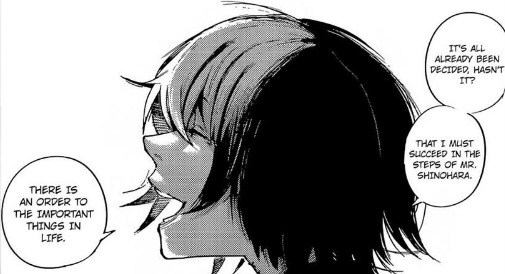
Juuzou right now is not acting entirely on his own will, but rather how he thought Shinohara would. If anything, Uta’s use of Shinohara’s face to instantly distract Suzuya (this same trick did not work on Take at all) just shows how unresolved these issues in Juuzou are. Which makes sense as Shinohara was suddenly taken from Juuzou traumatically, and he was given no chance for closure.
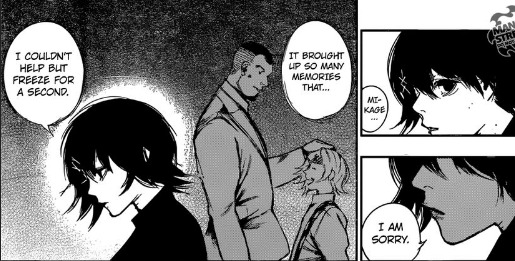
(Note also, returning to my argument of parallel running plots informing each other. Donato says in this same chapter “You choose to do these things? You wanted to acknowledge him didn’t you? Wanted him to pat your head in approval.” Which suggests that Suzuya’s motivations may not be as nobly for the sake of the whole CCG as he might suggest).
Shinohara was a good person who reached out to Juuzou, but he was also one of the CCG veterans. Him, Kuroiwa and Aura basically exist in a bubble where they are so secure in their status they do not even question the killing of ghouls. Aura refers to them as rats, for example. Shinohara quite famously called Kaneki “The Craziest Ghoul he’s Ever Met” even though the audience knows that Kaneki is a very gentle person who wants to be gentle but is the product of a violent system. While to the CCG career investigators, it might just be a job for them and they are not even unnecessarily violent like Mado was, their job however is still to take away life. This isn’t even a point on my part, but rather something stated directly by the manga.

Therefore at this point in his arc Suzuya has reached a point where he is in a similiar position as Shinohara. He has developed enough that he no longer acts unnecessarily cruelly towards ghouls, and even cares about those around him and goes out of his way to watch over them, but he has no developed all the way.

In that case, Juuzou’s relationship to Mutsuki is also incomplete. While Juuzou has taught Mutsuki not to be fearful of his strength, he’s not nearly reached out enough as Shinohara did to him. The reason we can tell is because the moment Mutsuki left Juuzou’s supervision, he began to violently dissociate again. He doesn’t perfectly understand yet how to stand in Shinohara’s shoes, because he can’t see how the system is failing both him and Mutsuki.
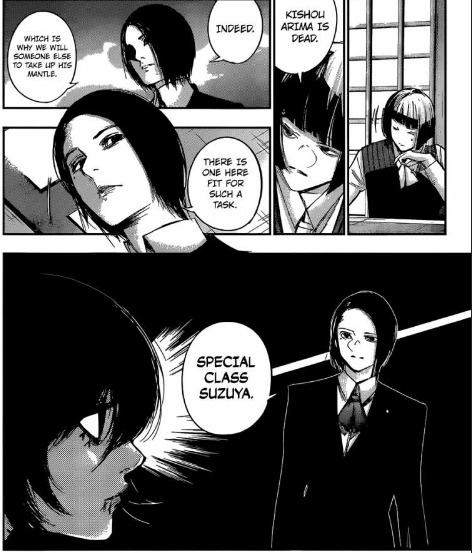
That’s why this moment, which should be the climax of Suzuya’s arc if he really were only just about climbing the ranks of the CCG and becoming a better investigator, falls so flat. While being considered talented enough to replace Arima is at least a good thing from a positive reinforcement perspective as in the past Suzuya has been maligned from all around him, you have to consider what we now know about Arima.

That Arima hated his position, prestige, and wished for nothing but death despite being the strongest. He was a person who had enough empathy for ghouls that killing them made him hate himself. The person now stepping into the role of Arima Kishou’s shoes, has basically no empathy for ghouls, and thinks very little about whether or not a ghoul life should be considered as an equivalent. If Juuzou really follows the path of Arima, he’ll either be corrupted by his attitude of just following orders, or come to hate himself.
The bottom line of Juuzou’s arc right now, is that gaining strength and recognition in the CCG did not lead him to happiness. That is also the point of Urie’s arc-
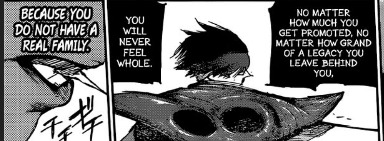
The point of Ui’s arc-
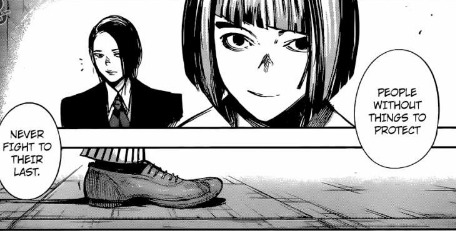
And also, it is what Mutsuki’s current breakdown led to Mutsuki’s current breakdown. All three of these characters are entirely reliant upon the system to give them security, and these same characters are failed by that system.
This is where we return finally in the comparison between Suzuya and Mutsuki to talking about Mutsuki.
Let’s begin with the question posed at the start of the Suzuya and Mutsuki comparison. Why does Suzuya flourish in the CCG, while Mutsuki is currently spiraling.
While that could be answered with perhaps a different chain of events, Mutsuki would not be in the current state he is right now without Torso’s interference, and therefore Mutsuki right now is not a 1:1 comparison to Suzuya because he’s fresh from being captured and tortured, I would say that’s not the case.
We’re going to talk about Torso in the Kaneki section of this meta, but mainly to dismiss that argument now, the manga makes it pretty clear that Mutsuki’s current existing problems existed with him from the start even before Torso, and even during the earlier arcs such as the auction arc, stretching far back to his academy days.
Then the true difference between the two of them lies where their failed coping device lies. Both of them are dealing with trauma using violence, but remember Mutsuki killed the cats, and Suzuya did not.
This is because Mutsuki’s way of coping is internal, while Suzuya’s is external. We see this also, right at the establishment of Mutsuki’s trauma. Mutsuki’s way of dealing with the violence inflicted upon him was to placate his tormentor, and escape deep into himself.

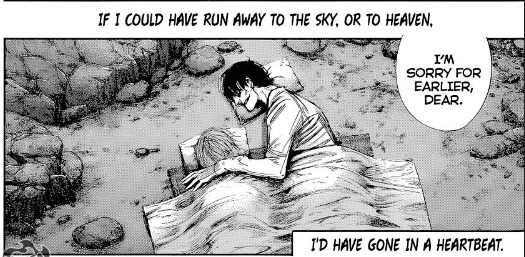
His way of coping has always been internal. He tries to retreat within himself, and find security there. Which is what eventualy led to his violent lashing out on everything around him, without even being conscious of it.
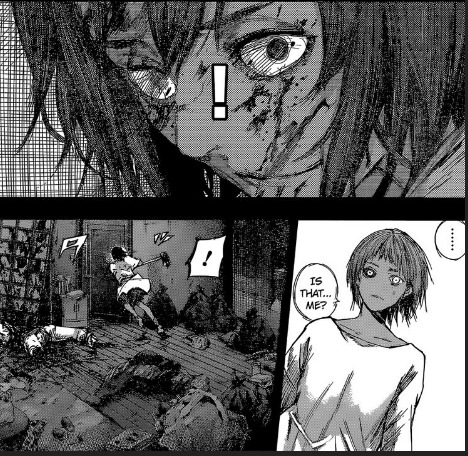
Which is why Mutsuki watches his own body move to violently kill his parents, while he himself is not aware of it. His way of coping was to escape from the current reality by retreating into himself, and then withstanding as much violence as he could until he violently lashed out. Mutsuki also has a pattern, almost exclusively to male figures in his life of enduring their abuse, and giving them affection regardless. His main method of dealing with them has always been to play passive. This scene right here, is it Mutsuki being exceptionally kind of accept Urie even after this, or is it Mutsuki just repeating a pattern he’s played towards men all of his life.


He shows the same behavior towards Torso, and Haise as well. This establishes Mutsuki is caught in a pattern of behavior, but if that is so why did the pattern of violence repeat even after Mutsuki had been removed of his abusers and placed into at least somewhat safer housing?
The answer lies in that same internal motivators. Mutsuki found what he wanted (internal security) in violence (killing his family). Therefore, he will continue to seek that internal security by becoming more violent. His character arc too, also follows this path. While people praise whatever good character arc Mutsuki had before the point of Torso interfering in it, I’ve always seen that as a misreading. Mutsuki’s character arc has always been about getting stronger as a ghoul investigator first and foremost.

Juuzou’s advice to Mustuki even revolves around this strength based personal growth route, as he tells Mutsuki that getting rid of his fear will amount to taming his weakness.

Nice words indeed, but that same line of thinking leads to mindsets like this.

I’m not here to argue that Mutsuki is a bad person, or that he’s never grown as a person, but rather that he’s been attempting to grow the wrong way since the very beginning. Therefore the notion that Mutsuki had an excellent character arc, then Ishida decided to veer off with Torso and go in an entirely different direction is a misnomer. Mutsuki has been heading this direction all along, and will continue to head this direction. Not because he’s a bad person, but because his coping mechanism is wrong, he’s using violence against ghouls an entire race of sentient thinking and feeling beings, as a method of securing his own internal security.

He views ghouls as violent. Therefore he can conveniently blame his own internal violence on them, while also being able to enact violence against them in order to feel more secure. Not once in the entire narrative has Mutsuki ever questioned whether it was okay or not to kill ghouls, he was only reluctant because he was afraid of he, himself, becoming violent and uncontrollable like he thought they were.
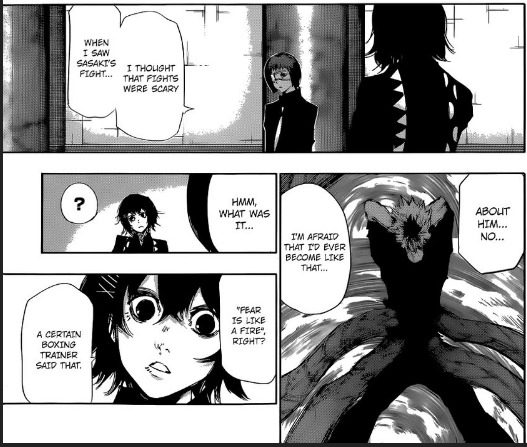
This of course, isn’t Mutsuki being a bad person either, but rather a bad coping mechanism that has been encouraged by the CCG. There’s no way the CCG actually believed the lie that Mutsuki’s parents were killed by ghouls, as he was holding the blood stained axe while he said it. However, they chose to play along with and encourage this delusion of his in order to turn him into an investigator. Then they slapped a dangerous weapon inside of his body and left him alone without much guidance.

Therefore Mutsuki has moved to the point where he now is taking advantage of the CCG’s reckless handling of them as an excuse for his own violence.
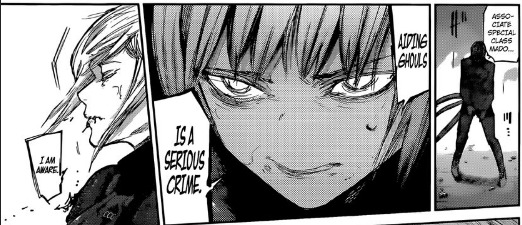

There are others who have interpreted this as Mutsuki specifically lashing out against Akira because she is a mother figure in an Oedipus/Electra tragedy, but I would say Mutsuki is just completely disregarding Akira as a person here. The CCG has sanctioned him to be violent against his ghoul, and Akira is standing in the way of that. Therefore, according to the CCG he also has a right to be violent against her as well.

As foreshadowed here by Mutsuki cutting Akira on accident. It’s not that he has any malice towards her, she was simply stading in the wrong place. Who he can and cannot kill seems arbitrary by this point, but wasn’t it like that to begin with? Mutsuki is simply following the CCG’s dictation, that it’s okay to kill ghouls, but not to kill human.
So this behavior, of Mutsuki mercilessly taking out low rank aogiri ghouls while his arc was ‘on track’ is totally okay.

However, Mutsuki suddenly turning against Akira and stabbing her is “not okay” and Mutsuki “going off track in his arc.” Not to mention the various implications he has been killing humans.
Even if Mutsuki’s arc were different, and he did not start to pick up the behavior of killing humans. If he had never killed his parents, and his tendency towards violent fugue states was removed from him, he would still be just as morally dubious. He would still be a murderer, because the base of his self confidence, is and has always been getting better at killing ghouls. That is the central problem of his character.
Mutsuki even acknowledges there’s no difference. Murder is murder.

Therefore, the CCG growth path which worked for Suzuya at least part way is not working for Mutsuki. This is because his problems cannot be solved with external validation like Suzuya’s could, what he needs is internal. From a character development standpoint I would say hat he needs is better self reflection, but from a point of in story goals to work towards, this is what Mutsuki wants:

Basically the same thing Urie wants, to have the internal security of having a family and feel that human connection. However, Mutsuki makes the mistake of trying to find this security through violence rather than reaching out to others. Therefore most of his instability comes from an inability to fail to realize and act on that basic need.
I am horrible because I do not realize a thing. I am repulsive because I cannot realize a thing .
Therefore unlike Suzuya, the central problem of Mutsuki is not his violence but rather the way he thinks of that violence and the way he relates it to himself. Which will require a different character of comparison to finish up this argument.
Kaneki Ken, or How I Learned That Being a Ghoul Does not Automatically Make One Violent
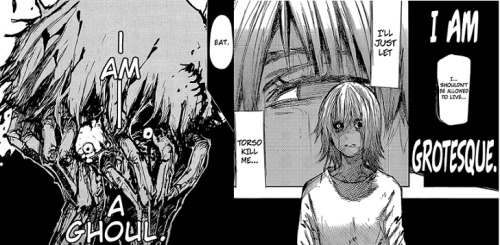
Kaneki’s arc with Yamori is one of the most famous in the manga, and is paralleled pretty effectively with Mutsuki. I am not going to recap that, because both are pretty obvious and this is more attempting to look at how the plot lines tie together. Basically though, Kaneki starts to amke an unconscious association of his ghoul side with violence and his human side with his ability to show kindness.
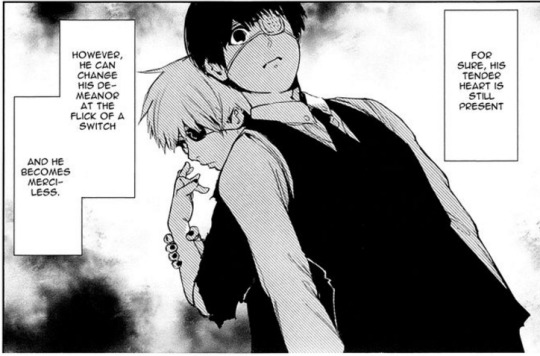
That’s why his tender side has always been represented as black, and his violent side as white. Not only has he always oversimplified his own narrative and seen his lost innocent self as his Black Haired self who tried to continue to pretend to be human, and his White Haired self as his corrupted self who lived as a ghoul, but also that Kaneki’s view on these things has always tended to be black and white.
This is the trait which Mutsuki parallels the strongest, their inborne hypocrisy and internal notions where they automatically associate ghouls with their violent and fearful side, and humans with their more peaceful side. Especially when on a basic level their violent tendencies did not arise from the abuse inflicted onto them by ghouls, but rather by humans.
Kaneki says “I am a ghoul.”
Mutsuki says “I am grotesque.”
In other words, ghouls are grotesque. That’s obviously not the case though, as the entire manga has been trying to make the argument that ghouls are the way they are because of circumstance, rather than natural tendencies towards violence.

However, despite being directly told that lesson we see Kaneki show a clear bias towards the way he fights against humans.

And the way he fights against ghouls.

There is no strategic reason for simply cutting the tendons of the V members, or even risking trying to perform such a precise maneuver when he can cut their heads off. Now, it’s not right to kill humans, but there’s at least strategic reason for it when you are fighting a war. The V members which Kaneki assumes are human are all part of a ruthless regime which Kaneki is now currently fighting against, and have been responsible for the deaths of innocent ghouls for generations, he has no real reason to show mercy on them because they are not going to change their ways, and their living probably means more dead ghouls in the future. The people who Kaneki is supposed to be fighting for as a whole. However, Kaneki is not acting on logic here but rather his own internal sensibilities. Basically his own emotions are dictating his actions.Subtext, which was brought as text when Ayato specifically called him on that.

This extends to Kaneki’s strategy as a whole. That because the CCG is made up of a few people who are decent, or even because it is run by human beings, he does not act to destroy it no matter how many horrible things he witness it doing, but rather wants to reason with it.
This bias can be seen in how his strategy plays out, how he is risking a few of the strongest members of his force, as well as abandoning his main fighting force when he is supposed to be the strongest one leading them in order to save one human being who is a former ghoul investigator at that. Or how his strategy revolves around so far fighting other ghouls to protect ghoul investigators. Instead of doing the obvious thing, and fighting ghoul investigators to protect ghouls.
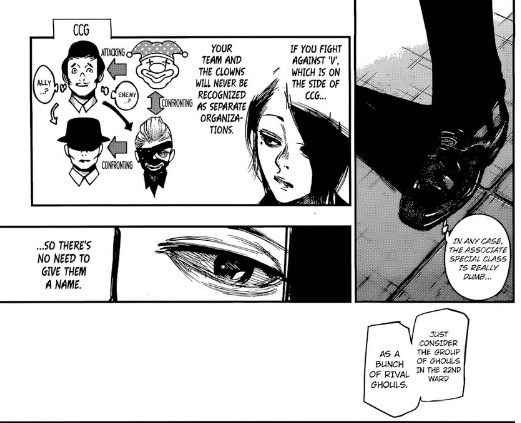
I don’t think Furuta’s being overconfident in his analysis, just accurate. If Kaneki is going to protect the CCG by fighting the clowns, but then fight V at the same time he won’t be seen as a separate force, he’s just making meaningless distinctions based on his own personal feelings. His strategy is failing. That is why the entire point of this arc is how meaningless the distiction between human and ghoul is, when it comes to the value of their lives are. As highlighted by this specific action on Furuta’s part.
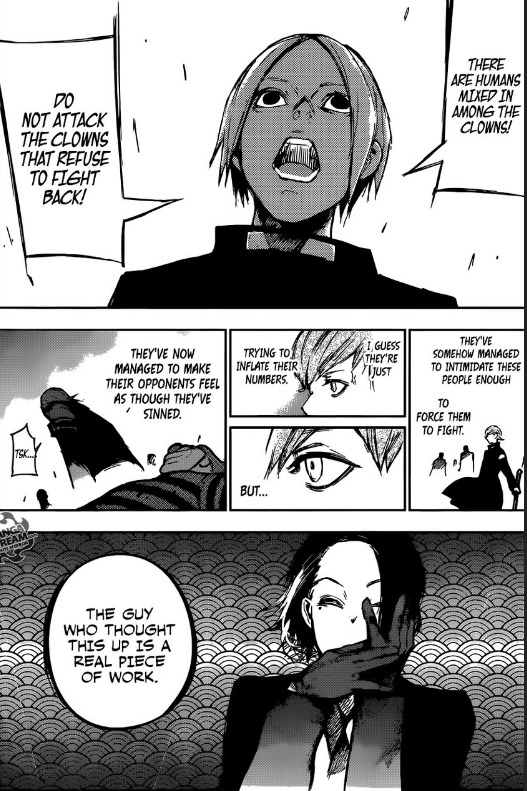
He’s making the point and making it hard, what led to the reckless loss of human life in this situation is because the CCG all along has been treating ghouls like enemies to be exterminated and slaughtered without discretion. Except there’s no real difference between the value of a human life and a ghoul life. Suddenly feeling guilty now that they’ve been accidentally killing humans while attacking ghouls, is merely a hypocrisy on their part.
Kaneki and Mutsuki’s strongest shared element is their internal hypocrisy on this subject manner. Mutsuki just makes it obvious though, by not distinguishing at all anymore between human and ghoul.
To reinforce this argument though, let’s return to the way that Mutsuki and Kaneki imitate their abusers. For Kaneki it was the picking up of torture, as well as the knuckle cracking. Mutsuki has started to tap his fingers as Torso did.

He even removes his shirt as Torso had.

And Also Mutilates corpses as Torso did, to pretend they are a proxy for who he really loves and prevent them from ever escaping.
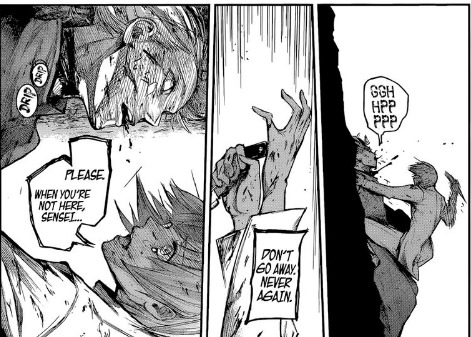
Showing that Mutsuki has picked up some of Torso’s habits though, is not to say that Mutsuki is just as bad of a person as Torso though. It’s because Mutsuki assumed that Torso was a terrifying person, and a monster because he was born a ghoul, because he had to eat flesh in order to survive. Rather, that it was circumstances that changed them.
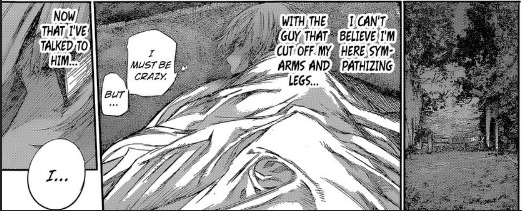
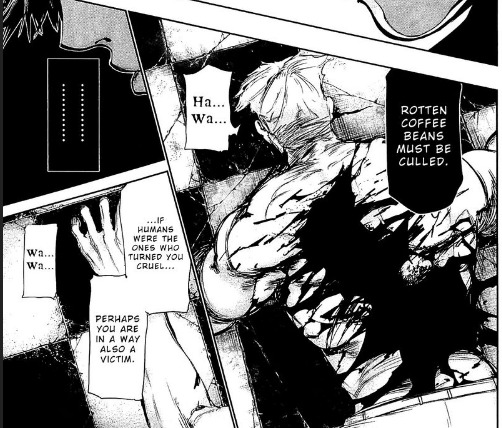
Kaneki and Mutsuki both come close to sympathizing with the backstories of their captors, however they both assume their different in some way. That they will overcome the cycle of violence. While they do have that capability and they are strong people, I would argue this belief comes from the fact that both Kaneki and Mutsuki were born humans. No matter how ghoul like they become, they will see themselves and their inherent worth as different from Yamori and Torso.

So what happens then when two people who were born human, end up picking the same habits of the monstrous ghouls who abuse them? It’s pretty good evidence that ghouls themselves are not inherently violent or even predisposed towards violence, but even humans put in those same circumstances will pick up similar violent tendencies.
Therefore, in total this is the reason why Mutsuki’s arc has become so violent, and also why Mutsuki needs to be the focus of this violence. Because Mutsuki is a representative of the entire CCG’s attitude towards ghouls, by being a product of its very dangerous system of taking children who were injured by ghoul attacks and instead of giving them proper closure and homes, raising them to hate and kill ghouls.
Mutsuki would need to be so obviously violent because otherwise the point would not be so obvious to the audience. This is how Mutsuki’s seemingly tangent character arc ties back to the main plot, and why it seems so visceral. It’s showing us the violence inflicted against ghouls we’ve seen through the manga all along, but gotten used to, but making it obvious once again just how horrifying that violence is.
Therefore I would say from this point forward Mutsuki’s arc is actually pretty clear. Once he stops seeing things as black and white within his own mind (ghouls= bad, grotesque, humans= good, kind) then he will be able to take his actions at face value. What prevents Mutsuki from growing and causes him to spiral is his inhability to do so, his constant lying. That’s why I think at some point Mutsuki is going to be removed from the framing of the CCG which is influencing and exploiting his thoughts to turn him more violent, and be able to reach a point of self realization as Kaneki did, where he was able to truly look at himself.
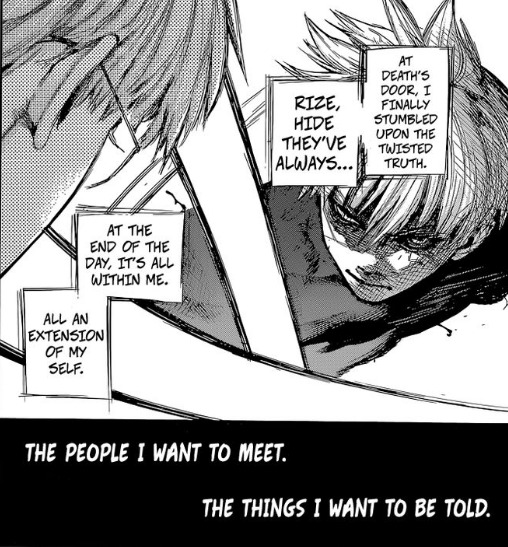
In other words, hopefully Mutsuki soon too will be able to break his own egg.
867 notes
·
View notes
Text
When the Euphoria Fades: Dealing with the Highs and Lows of Love
“We come to love not by finding a perfect person, but by learning to see an imperfect person perfectly.” ~Sam Keen
When we fall in love, we feel excited to experience some of the most joyful moments of our lives. Because love is supposed to be the source of the best feelings, right? But what about when that relationship churns up some hard stuff and leaves you feeling hurt, annoyed, sad, and irate?
For many of us, especially deep-feelers like me, when we start to experience these inevitable lows in our relationship, we may conclude that something is inherently wrong with it.
But what if that assumption is just smoke and mirrors? What if it is preventing you from truly experiencing the real love you crave?
Believing something is wrong with your relationship might, tragically, lead you to conclude that the relationship has failed and should be ended, even though it’s actually pretty healthy and promising.
“I’ve been annoyed with him a lot lately,” and, “We just haven’t been connecting much” are common complaints I hear from people I talk with. Followed frequently by the sentence of doom, “Maybe I made a mistake by marrying him.” “Maybe they aren’t meant for me.”
I’ve made that same jump of reason in the past. Multiple times in my twenties, I ended relationships full of potential because bad feelings were arising more often than I thought they should. I thought it meant something was wrong with him or with us.
Being someone who is highly attuned to what I feel, I have always taken my feelings really seriously. When I feel bad, I feel really bad. And when things feel, well, blah, I feel that deeply, too.
As had been my norm in past relationships, when my partner and I began to get over those hormone-stoked, bursting-with-love early months of our relationship, I started to feel moments when things didn't feel “good” anymore. When it all felt “dull.” When he wasn’t behaving how I thought he ought to. When we weren't “connecting” like I thought we should.
Like I had done in the past, I could have taken this as a sign that something was wrong with our relationship, and that he was the wrong man for me.
But I was gifted with a powerful secret that changed everything at a relationship workshop we had attended together to preemptively deal with the normal stuff that sabotages great relationships (we were committed to this relationship thriving): This dullness was normal and healthy.
What?
As I let the power of this one mental shift sink in, and marinated in the subtleties of what it meant, my relationship began to full-on thrive—and continues to years later.
My hope is that it can change your relationship for the better, too.
Let’s Investigate This Further
Imagine your emotional life as a spectrum from terrible to wonderful, with neutral in the middle. It is completely normal to spend one-third of the time on the negative side of the emotional spectrum, one-third on the positive, and one-third in a neutral state.
When we believe that love should always feel good, we often experience the neutral times as less-than good, which we interpret to mean bad. We turn “okay” into “bad” and “bad” into “terrible.”
This is especially true for sensitive souls like me, because we feel things so deeply: anything less than positive registers as uncomfortable, or negative.
When I realized that two-thirds of the time it is absolutely normal to not feel “good” when it comes to my love life, I felt immense relief.
It means that there is nothing wrong with my experience. It means I can stop feeling upset that I’m upset, or mad when things are just okay. I can stop feeling so disappointed when I feel unhappy, dull, irritated, sad, or confused.
I now see that it is the measuring of my experience against some ideal and unrealistic standard that feels so extra bad. It’s my resistance to what I am actually experiencing that feels terrible.
So now I say, so what if I feel a bit of discomfort, or things are a little dull inside me, or between my man and me. So what if I am experiencing numbness or just okay-ness. I can just let it be what it is, knowing that it is normal and healthy, and it will change soon anyway.
I'm not suggesting we tolerate abuse or mistreatment for any percentage of time; just that it's normal to not always feel head-over-heels in love and blissfully happy.
One of the biggest benefits of “embracing neutrality,” as I call it, is that my joy is amplified during the times my partner and I are really connecting well. How could I even know what good was if I never felt it's opposite?
Contrast is the truth of life. Contrast is part of our humanity. To have a rich love life, embracing all our feelings is the only healthy path. Because, as we allow it all, we fall deeper in love with life, and everyone in it.
Though my life is filled with the same amount of sad, annoyed, frustrated, bland, and ho-hum moments as ever, the way I experience them has entirely changed: so much softer, so much less agonizing.
And as I have practiced being accepting of the neutral times, I've actually begun to appreciate them more. When I welcome neutrality, the ho-hum moments almost start to feel good, too. That means I now feel more good feelings than bad ones, by far.
If you’d like to recognize and get comfortable with feeling less-than-great so you can avoid ruining a good thing, here are a few tips:
1. Use gentle awareness and be really honest with yourself.
When you notice you are feeling less-than-great (just less-than-great for your first few times, not terrible), get curious about what you are really sensing. Feel your emotions. Notice what physical sensations are there. Do you feel constriction? Or openness? Or a vague sense of nothing?
2. Assess your feelings.
Rate this body-feeling on a scale from one to ten, ten being the best you could feel, five being neutral, one being terrible.
3. If you rate below a six, really investigate with curiosity how that feels in your body.
Allow it to be as it is. Notice that it isn't a problem to not feel good. It’s just a bunch of interesting sensations. Even unhappiness isn’t so bad when you look at it with gentle curiosity. You are safe to experience what you feel.
When you do this a few times a day you will expand your capacity to tolerate discomfort. You may even realize that you can actually enjoy your significant other’s imperfect behaviors and human quirks that were bothersome in the past.
Like the nights he is mentally absorbed by a work issue and acts distant. The times he says, “uh-huh” before you even finished what you were saying, as if he wasn’t really paying attention. When he picks his nose in public…
Because most of us, let's be honest here, are a far cry from perfect. No one will ever truly fulfill and delight you all the time.
That is actually your job, not your partner's! It is your work to drop the expectations, comparisons, judgments, fears, and beliefs that are interfering with the health of your relationship and to learn to care for the normal, bland, day-to-day humanness of your sweetie.
Because if you don't embrace the dull times, you are much more likely to lose the whole glorious package by rejecting your experience and your partner a majority of the time.
When I notice I’m resisting feeling dull or I’m a bit uncomfortable about something going on in my relationship, I now use this powerful affirmation to remind me that discomfort is simply part of being a human in love: “My relationship is most authentically and deeply loving when I allow the seasons of my heart to come and go, experiencing them all with presence and acceptance.”
If you embrace neutrality like I have, instead of believing it means something has gone wrong, the neutral times become like a glass half full (instead of half empty). The good times become rich and wonderful. And those truly hard moments? They are simply reminders of how delightful the good times actually are, and reinforce their joy.
About Hannah Brooks
Hannah Brooks is a Relationship Coach who helps caring, sensitive, deep-feeling women create the supportive, loving, and genuinely connected relationship they really want with their partner. For further tips and guidance check our her free toolkit, 3 Essential Steps to a More Loving Relationship, Even When You Feel Irritable, Resentful, or Disconnected. Find her at lifeisworthloving.com.
Web | More Posts
Get in the conversation! Click here to leave a comment on the site.
The post When the Euphoria Fades: Dealing with the Highs and Lows of Love appeared first on Tiny Buddha.
from Tiny Buddha https://tinybuddha.com/blog/love-relationships-blog/highs-lows-love-no-relationship-feels-happy-all-the-time/
0 notes